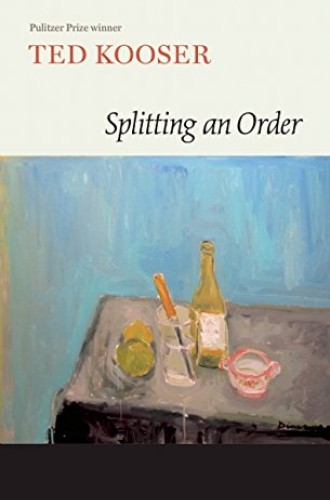Splitting an Order, by Ted Kooser
Overarching the fine details of the poems in Splitting an Order is the poet himself as companion to his place in the world. Simple, measured, and settled, the poems were composed by an artist with nothing further to prove. Ted Kooser has won the Pulitzer Prize, was a poet laureate, and is now a professor of high regard, but everything around him is available for framing and showing. A lifelong resident of the American heartland—born in Iowa, now a resident of Nebraska—Kooser has a vision rooted in the geographic and spiritual center of America.
Like the biblical Adam watching the parade of animals in front of him, Kooser helps us notice and name things. When his poetic attention falls somewhere—on any object, living, dead, or inanimate—he features it and honors it in a clean, simple composition. This is an outcome of years of practice.
One poem draws our attention to a blind woman’s kiss at an Arby’s restaurant, another to an Asian man in a chicken suit, another to an old snapshot. Yet another opens the door of a barn, steps inside, and addresses an opossum on the floor. Kooser notices a sundial, a birdhouse, a tree frog, and an old rusty lantern that in its prime was “not more than a cup of warmth, / as a farmer carried it over the snow.” He considers a dead fly, a mouse in a trap, a wasp’s nest, a backyard fish pool, and a moth “clipped from the edge / of the night.”
Kooser’s searching eye is also drawn to people in relationship. The book’s epigraph, 2 Kings 2:6 from the King James Version, strikes an opening chord of companionship: “I will not leave thee. And they two went on.” In “Swinging for Parents,” Kooser notices the way a child is suspended between her father’s and mother’s hands, making “the shape of the y at the end of infancy.” He presents other companions as well with quiet elegance: an elderly father and his son holding hands as they negotiate a staircase; two women, one in a wheelchair, choosing a greeting card in a gift shop; a woman facing the future without her husband.
Near the end of the book is “A Person of Limited Palette” in which Kooser indulges a daydream of sunset artistry at some seaside location: “I would have loved to have lived out my years / in a cottage a few blocks from the sea.” The biographic fact is the creative core of this fine poet’s work: “If you should come looking / for me, you’ll find me here, in Nebraska.”





